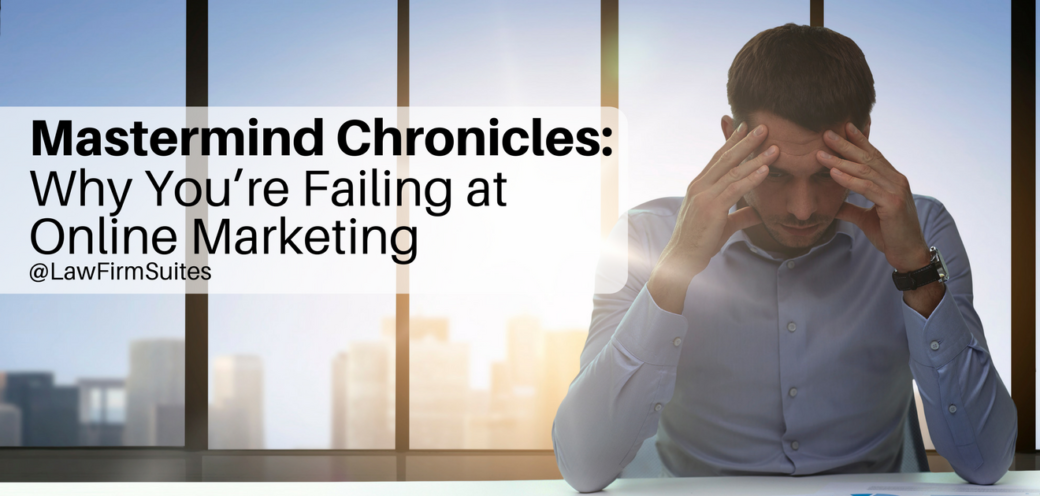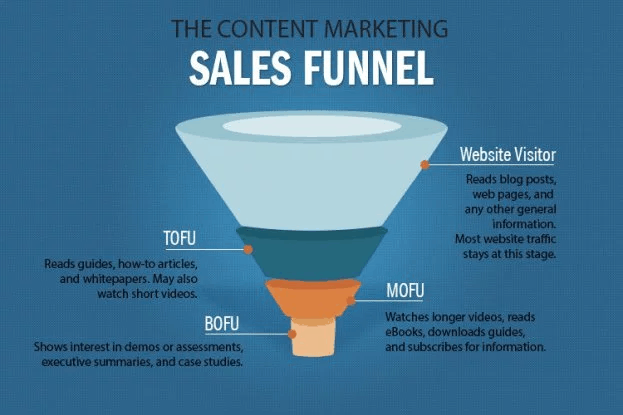If you make these online marketing mistakes, then you’re going to fail. It’s only a matter of time.
In our mastermind group meeting this week, a question came up about online marketing. A solo with a new, but rapidly growing practice, was feeling like he should be investing more money in online marketing.
“It’s the future of legal marketing,” he said.
To date, the attorney has been doing really well with a traditional networking strategy. He has new cases coming in steadily, and happy clients are referring friends. But he felt there were different marketing opportunities out there.
This attorney has dabbled in online marketing, including “an expensive Avvo premium advertising subscription” and Facebook ads. According to the attorney, these were both a failure.
We weren’t entirely surprised.
Why Online Marketing Fails for Most Attorneys
Facebook ads, AVVO subscriptions, Google Adwords, blogging are all a lot sexier than the grind of one-to-one networking. But most lawyers fail at online marketing for one main reason: They don’t fully commit to it.
Lawyers are used to getting referrals, and those prospects are typically ready to buy legal services. This type of client prospect already knows they have a problem, and understands that hiring attorney is part of the solution.
In marketing terms, this is called a “bottom of funnel” (or BOFU) lead.
If you imagine your firm’s marketing as a funnel, those leads who are ready to buy legal services are already at the bottom of the funnel.
The problem with online marketing is, most lawyers only focus their efforts on bottom of funnel leads. After all, this is what they are used to getting from traditional, referral-based marketing.
But, more often than not, people who end up on lawyer websites are not even sure they have a problem and are just seeking more information. They are not ready to buy legal services yet, and won’t be until they are convinced they have a problem and understand that a lawyer can help them solve it.
TOFU, MOFU & BOFU: The 3 Phases of Successful Online Marketing
So, if your online marketing is concentrated on “hire me now” BOFU messaging, it’s wasted on a good chunk of leads.
These “top of funnel” (or TOFU) leads are still valuable, but it’s up to you to nurture them into bottom of funnel buyers by providing them with content that is aimed at where they are in the marketing funnel.
TOFU content should answer questions about their problem without asking them to hire you. Once the prospect understands they have a problem, you should begin targeting the prospect with “middle of funnel” (or MOFU) content about how they can begin to solve their problem. Like with TOFU content, you are not selling legal services yet.
Remember, there are many ways to solve legal problems. People can do nothing. They can represent themselves pro se. They can use non-attorney legal services. They can get unbundled legal services, or they can hire a full-service firm.
Be candid about what the options are, and present the type of services your firm provides as one of the solutions.
Only after this phase will be prospect be ready to start engaging with BOFU marketing content like case studies, testimonials or free consult offers.
Sometimes you’ll get lucky and a person will move directly to the bottom of funnel, but for an online marketing system to consistently deliver a strong return on investment, it requires having all three phases in place.
What You’ll Need to Execute a Successful Online Marketing Strategy
Once you have content for each stage of the marketing funnel, you’ll need a way to get it in front of prospects, and you’ll want to have tools to convert those prospects into actual leads.
These tools will peak the interest of a top of funnel lead and get them to identify themselves so you can deliver new content for each phase of the marketing funnel.
Here is a list of what is needed to make this happen:
- Search engine optimized (SEO) web pages that rank high on search engines and drive leads to your website
- Optimized content that answers questions typically asked by your ideal client
- Social posting that drives traffic back to your optimized content
- A website that is optimized to get leads to identify themselves (called lead conversion), that has:
- Testimonials
- Client videos and stories
- Resources that answer questions
- Lead magnets at each stage of the buyer’s funnel, consisting of high-value eBooks, quizzes, checklists that require leads to give their email addresses to access
- Landing pages with lead capture forms designed to offer your lead magnets
- Lead capture management system, like Infusionsoft or Hubspot, to collect emails
- Series of automated emails that nurture leads through the buyer funnel (called workflows)
- Google Adwords or Social Ads to drive new traffic to your lead magnets
- Landing pages optimized for each ad
- Remarketing ads that continue to market to leads after they leave your website
- System for qualifying leads that contact you for consults (may be a high volume of unqualified leads, so you will need a way to qualify them)
- Analytics tool so you can A/B test offers, landing pages, headlines and more.
- A low-cost service item – because internet leads don’t have the benefit of a trusted person vouching for your credibility, they may prefer to get a small, inexpensive taste of your legal services before committing to a big project. Consider unbundling some of your services and offer a portion of your service for a very low cost. This could be a paid consult or a low-cost portion of the total project.
- Offer a “Profit Maximizer” – a high value upsell you offer to new or existing clients. It’s cheaper to sell to existing clients versus finding new ones. Develop something in your practice that your clients would appreciate and you can sell at a high margin.
- Implement a referral system – If you can get every client to refer two friends, your practice will grow geometrically (for a very low cost). Remind former clients about how great it was to work with you, and that they would be doing their friends a favor by recommending you.
It takes a lot of work to build a complete online marketing system, and most attorneys do not have the skills or time to execute it on their own. You can hire an agency to build it for you, but it will cost thousands of dollars, and then thousands more each month to maintain it.
There’s a place for this kind of marketing. If you’ve got the skills and time to do it on your own or the money to pay someone to do it for you, then go for it.
For everyone else, throwing together one or two components of an online marketing system and expecting a positive result is unrealistic, and will likely be a waste of your marketing dollars.
The Quickest Path to Revenue Growth is to Optimize What’s Working Now
Most attorneys are doing some offline marketing activity that generates new business. If revenue growth is on your mind, consider examining those marketing strategies and optimizing them to get more cases.
For example, if you are having success with networking, you could try these tips (which were recommended to the attorney who raised the original issue in our mastermind group):
- Hone in on the profile of whoever sends you the most referrals and focus your networking time to meet more of those people.
- Implement a follow-up system to stay in touch, at least monthly, with your new contacts.
- Implement a referral system to make it easier for your former clients to refer their friends.
- Hire a virtual or part-time assistant to help you execute your new strategy.
You will see better results faster if you simply put more time and effort into the strategies that are already working before starting a new online marketing campaign.
Conclusion
Online marketing is a great tool as long as you have the financial bandwidth to implement a complete online marketing system.
Because the cost can exceed $30,000 or more a year, unless you’ve got the time and resources to properly execute an online marketing strategy, it may be better for you to stick with tried and true traditional marketing tactics, and dive into online marketing when your budget and calendar allow for it.
Ultimately, the attorney in our mastermind group decided to back-burner his online marketing strategy until he has the resources to make it happen. For now, he is going to be doubling down on his networking and client referrals.



